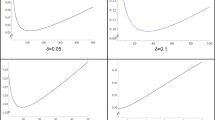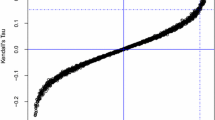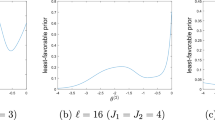Abstract
This article introduces a Bayesian method for testing the axioms of additive conjoint measurement. The method is based on an importance sampling algorithm that performs likelihood-free, approximate Bayesian inference using a synthetic likelihood to overcome the analytical intractability of this testing problem. This new method improves upon previous methods because it provides an omnibus test of the entire hierarchy of cancellation axioms, beyond double cancellation. It does so while accounting for the posterior uncertainty that is inherent in the empirical orderings that are implied by these axioms, together. The new method is illustrated through a test of the cancellation axioms on a classic survey data set, and through the analysis of simulated data.
Similar content being viewed by others
References
Bernardo, J. (1979). Reference posterior distributions for Bayesian inference. Journal of the Royal Statistical Society, Series B, 41, 113–147.
Domingue, B. (2014). Evaluating the equal-interval hypothesis with test score scales. Psychometrika, 79, 1–19.
Gelfand, A., Smith, A., & Lee, T.-M. (1992). Bayesian analysis of constrained parameter and truncated data problems using Gibbs sampling. Journal of the American Statistical Association, 87, 523–532.
Gutmann, M., & Corander, J. (2016). Bayesian optimization for likelihood-free inference of simulator-based statistical models. Journal of Machine Learning Research, 17, 1–47.
Hoffman, P., & Beck, J. (1974). Parole decision-making: A salient factor score. Journal of Criminal Justice, 2, 195–206.
Karabatsos, G. (2001). The Rasch model, additive conjoint measurement, and new models of probabilistic measurement theory. Journal of Applied Measurement, 2, 389–423.
Karabatsos, G. (2006). Bayesian nonparametric model selection and model testing. Journal of Mathematical Psychology, 50, 123–148.
Kruskal, W. (1964). Nonmetric multidimensional scaling: A numerical method. Psychometrika, 29, 115–129.
Kyngdon, A. (2011). Plausible measurement analogies to some psychometric models of test performance. British Journal of Mathematical and Statistical Psychology, 64, 478–497.
Kyngdon, A., & Richards, B. (2007). Attitudes, order and quantity: Deterministic and direct probabilistic tests of unidimensional unfolding. Journal of Applied Measurement, 8, 1–34.
Li, Z. (2008). Some problems in statistical inference under order restrictions (Unpublished doctoral dissertation). University of Michigan.
Liu, J. (2001). Monte Carlo Strategies in Scientific Computing. New York: Springer.
Luce, R., & Steingrimsson, R. (2011). Theory and tests of the conjoint commutativity axiom for additive conjoint measurement. Journal of Mathematical Psychology, 55, 379–385.
Luce, R., & Tukey, J. (1964). Simultaneous conjoint measurement: A new type of fundamental measurement. Journal of Mathematical Psychology, 1, 1–27.
McCulloch, R. (1989). Local model influence. Journal of the American Statistical Association, 84, 473–478.
Michell, J. (1988). Some problems in testing the double cancellation condition in conjoint measurement. Journal of Mathematical Psychology, 32, 466–473.
Michell, J. (1990). An introduction to the logic of psychological measurement. New York: Psychology Press.
Perline, R., Wright, B., & Wainer, H. (1979). The Rasch model as additive conjoint measurement. Applied Psychological Measurement, 3, 237–255.
Price, L. F., Drovandi, C. C., Lee, A., & Nott, D. J. (2017). Bayesian synthetic likelihood. Journal of Computational and Graphical Statistics. doi:10.1080/10618600.2017.1302882.
Rasch, G. (1960). Probabilistic models for some intelligence and attainment tests. Copenhagen: Danish Institute for Educational Research: Danish Institute for Educational Research (Expanded edition, 1980. Chicago: University of Chicago Press).
Robert, C., & Casella, G. (2004). Monte Carlo statistical methods (2nd ed.). Springer: New York.
Robertson, T., & Warrack, G. (1985). An application of order restricted inference methodology to a problem in psychiatry. Psychometrika, 50, 421–427.
Scott, D. (1964). Measurement models and linear inequalities. Journal of Mathematical Psychology, 1, 233–247.
Silverman, B. (1986). Density estimation for statistics and data analysis. Boca Raton, FL: Chapman and Hall.
Wood, S. (2010). Statistical inference for noisy nonlinear ecological dynamic systems. Nature, 466, 1102–1104.
Zhu, W., Marin, J., & Leisen, F. (2016). A bootstrap likelihood approach to Bayesian computation. Australian and New Zealand Journal of Statistics, 58, 227–244.
Acknowledgements
The author is grateful for the detailed comments and suggestions by two anonymous reviewers and the Editor. They have helped improve the presentation of this article. Funding was provided by National Science Foundation (Grant Nos. SES-0242030 and SES-1156372).
Author information
Authors and Affiliations
Corresponding author
Electronic supplementary material
Below is the link to the electronic supplementary material.
Rights and permissions
About this article
Cite this article
Karabatsos, G. On Bayesian Testing of Additive Conjoint Measurement Axioms Using Synthetic Likelihood. Psychometrika 83, 321–332 (2018). https://doi.org/10.1007/s11336-017-9581-x
Received:
Revised:
Published:
Issue Date:
DOI: https://doi.org/10.1007/s11336-017-9581-x




